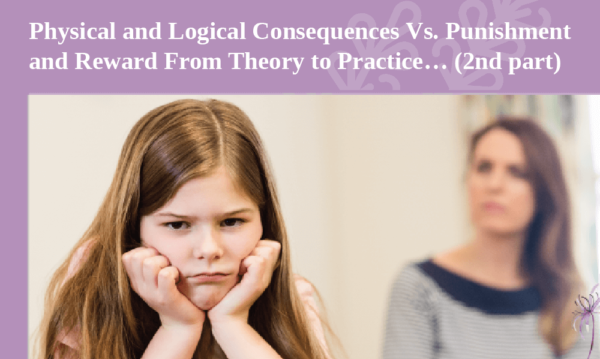How do we implement the Logical Consequences? Here are some critical steps we need to take to integrate the Logical Consequences into daily conciliation with our children:
1. Allow the election. The parent suggests possible alternatives and accepts the child’s decision indiscriminately. Then, the child makes his choice without external pressures. The tone of the parent’s voice should express an attitude of respect, acceptance, and goodwill. Equally important is the vocabulary he decides to use. In some cases, all you need to do is announce your intentions and let the child decide how to respond.
2. When applying a reasonable consistency, give the child the certificate that he will have the opportunity to change his decision. Often children, when given a choice, decide to try to reach the limits of your stability. When this happens, tell them that the decision is still valid and try again later.
3. If negative behavior repeats itself, increase the amount of time that must elapse before allowing the child to try again. If children continue to behave negatively, they send the message that they are not ready to take responsibility. After that, the parent should not use words to assure that the child will have another chance to try and determine the interval until then.
Below we will give some examples of problems, typical reactions, and physical and logical consequences that are particularly common in children’s daily lives.
Problem:
Daily morning routine: waking up, dressing, breakfast, leaving for school.
Common reactions:
You take responsibility for the child’s morning routine, i.e., wake it up many times, dress it up, feed it, take care of it, help it, grumble, threaten, and force you.
Physical and logical consequences:
Give the child an alarm clock and show him how to use it; tell him you expect him to take responsibility for waking up, getting dressed, eating, and leaving.
You can prepare breakfast. But the child decides whether to eat it. If he does not have time to eat, let the natural consequence of hunger lead him to determine that he will wake up earlier to be able to eat.
If a child who uses the school bus to go to school loses it because it took him too long to get ready, the logical consequence will be to go to school on foot (don’t take him with your car).
Problem:
The kid doesn’t want to eat certain foods.
Common reactions:
You remind him that you ask him to try a little, prepare special food for him, and use the dessert as a reward.
Physical and logical consequences:
Prepare the food and bring it to the table. Please don’t fill the children’s dishes yourself; let the children decide whether to eat or not; they can eat whatever they want from what’s on the table, as long as they don’t deprive the other family members of their portion. Children should understand that no other food is served before the next meal.
Problem:
Cleanliness
Common reactions:
You give orders; you remind, you embarrass, you continuously control.
Physical and logical consequences:
Tooth cleaning: Because the stench of breathing is incredibly annoying and because sweets contain ingredients that can damage teeth, give children a choice: wash their teeth or not eat sweets until they accept the responsibility of cleaning their teeth.
Bathing: There are two kinds of logical consequences: You can tell children that it is unacceptable to wear clean clothes with a dirty body. They will have to decide whether to wear clean or dirty clothes. If they choose to wear dirty clothes, their peers will be bothered by the smell and tell them. You can also tell the children that you accept the right not to bathe but that you also have the right not to tolerate the unwashed body’s stench. If they prefer not to bathe, give them a choice: either stay away from you or wash.
Problem:
Chores in the kitchen
Common reactions:
You remind, threaten, show intense anger, do the job instead of the child.
Physical and logical consequences:
Setting and collecting the table, washing dishes, and emptying garbage are some jobs that offer children the opportunity to participate in the family. They should be discussed and decided by all family members. A practical, logical consequence for any unfinished job is to delay the meal until this job is finished. If the children do not respond or the same thing happens again, you can decide to eat out and let the kids decide what to do; don’t worry about which one of them didn’t do the job. Let them share the responsibility they have to get the food ready; if the kids are too young to be alone, eat something rough after the kids have slept.
Often the dividing line between punishment and logical consequences is not easily discernible. The determination in the tone of your voice, your friendly attitude, and your willingness to accept the child’s decision are critical elements of the logical consequences. As logical as an act may seem, if your voice’s tone is harsh, if your attitude is aggressive, and if you are absolute in your demands, your action is punishment. For the consequences to be effective, time and patience are required. But changing your usual reactions will also bring about a change in your children’s responses. Remember to close your conversation with the child with a positive message that shows your appreciation and love for it.
References:
Dinkmeyer, D., McKay, G., D., (1976). Parent’s Handbook, American Guidance Service, Inc.


